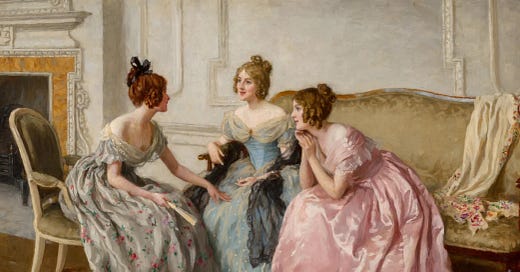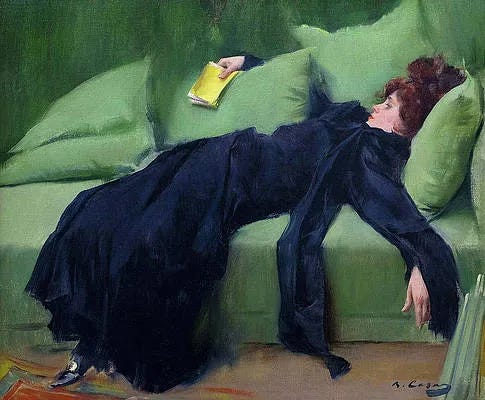Dear Modern Austen: How can I be part of a community that doesn't share my values?
Or, when Modern Austen can only provide a long, rambling answer to a complicated question.
Dear Modern Austen,
I am sick, and so my energy for interacting with new communities is low. I found an online writing group that I pay for, that I really liked. It seemed to reflect my values—leaning into the wisdom of nature, wriitng as a way of understanding who we are in the world, a way of listening to currents bigger than us, seeing big picture stuff, like time in a broader sense. I have enjoyed it so much and it means a lot to me. Some of it is that it is “something to do” when I don’t have energy to do much else.
I thought these people shared my values.
There are awful things happening in the world, being done by people who are going to be injured emotionally, spiritually, physically by doing them, and they are doing them to people who are defenseless. It is only possible because of dehumanization, which I believe to be one of the greater, if not the greatest, evils in the world. To forget another’s humanity…
I really love my writing group, but they are like, “Oh, how’s it going?” and no one is talking about this massive harm being done. I am sure of my sources. I am sure of my opinion that it must stop. What I am not sure about is whether I should stay in this group of people supposedly writing from their hearts, and their hearts are focused on traffic and potted plans, and I can understand those things, too. We are not meant to wallow in the trauma of others. It just feels like this incredibly loud silence. We are acting like we can have a writing class as normal, like shit is normal.
I’m not sure if it’s our fear of lapsing into “normalcy,” but should I say something even if it is? How can I be in community with people when they are so passive? I’m not telling every friend they should call congress; I’m doing that. But I haven’t done much except post to social media in terms of sacrificing older relationships.
Need Help!
If there’s a personal matter you’d like Modern Austen’s advice on, you can send your letters to modernaustenblog@gmail.com. Please indicate whether you’re comfortable with your letter being published, & do use a clever pseudonym.
Dear Need Help!,
Community can be a dangerous necessity for a modern heroine. There is no way to keep one’s neighbors out of one’s business: Someone’s mother will always discover that Netherfield Park has been let at last, & God help your family if your younger sister decides to ruin herself in Brighton! Communities are made up of people, Need Help!, & no matter how well-intentioned their purpose or pure their values, they still form small circles that can’t make space for everyone.— In a social circle, someone always needs to be on the outside. You thought that the values you shared with this group sealed you in securely, but you’re finding that these values aren’t being applied equally. You have to face the fact that what this community has in common is that you all pay money to meet & share your writing.
I’m sorry to hear that you’re unwell—that certainly makes finding community difficult, but it seems to have given you extra Lizzy Bennet insight for detecting shallow values. Perhaps being sick also makes you feel that you’re in greater community with the rest of the world. You want to broaden your social circle, not close it off, but this isn’t an impulse most groups share.— We want a clear division between who’s inside & who’s outside, who we should care for & who we don’t have to think about. That’s why we belong to classes. That’s why we join clubs. That’s why we pay membership dues. You’ve paid to belong to an exclusive community, Need Help!, & now you’re fighting against the group’s desire to ignore what’s outside of it. You want there to be a way to keep one foot inside the circle & one foot in the rest of the world, because your anger & frustration aren’t just with your writing group but the world you live in. The world is too big to be angry at all at once—it will only lead to a feeling of uselessness—so you have to be angry at the people you know, the people who, until this moment, appeared to share your values.
Perhaps they still do, but these are issues & traumas & conflicts that feel too far beyond their society to care or have an opinion about. Or, I’ve noticed, that people seem to casually care about things outside of what I would call their society horizon, as it gives them something to talk about within their circle.— Did you hear so & so was in Bath? That Miss — was snubbed at a ball? That Mr. — has fathered an illegitimate child? I’m guilty of this type of horrendous gossip, too, though I try to confine it to the letters I write to my sister. We like other people’s business when it makes good gossip! But I know your concern is with larger world events, events that everyone & no one is talking about, which makes the silence of certain communities particularly deafening. In her novels, Jane Austen rarely named what was happening beyond the societies she was writing about. She didn’t have to.— The pages of P&P & Emma & Persuasion, in particular, are filled with hints that her readers at the time understood perfectly.
As a literary effect, Austen’s opinions on the subjects she’s silent about come through loud & clear. If a major concern happening in the background of Emma is, in fact, the Enclosure Acts of 18th-century England—which would mean that a wealthy landowner like Mr. Knightley would have been actively enclosing small landownings in Highbury to create one large farm—then we can hear Austen’s opinion on these measures in how the different characters appear to be trying to create smaller & smaller social circles. When Frank Churchill first arrives intending to make Emma’s acquaintance, he asks her if “Highbury, perhaps, afforded society enough?—There were several pretty houses in & about it—Balls—had they balls?—Was it a musical society?” (vol. II, ch. V, p. 180). In this short passage, Frank reduces & defines the circle he wants to be part of, with Emma at its center. Characters are constantly moving in & out of Emma’s circle in the novel, allowing her to decide the emotional distance she can place between her & Harriet, her & Jane Fairfax, her & Miss Bates.— Someone like Robert Martin must always be kept outside the circle. Though she doesn’t name it, this is Austen being critical of polite British society & what it concerns itself with while the Empire is involved in foreign wars & slave trades & colonization.
But literature isn’t life. In her letters to Cassandra, she’s sometimes more direct, more inclined to name what was happening around the polite society she belonged to. “How horrible it is to have so many people killed!— And what a blessing that one cares for none of them!” (Letter to Cassandra, Friday 31 May 1811) Jane writes in reference to reporting in the Hampshire Telegraph about the Battle at Albuera, a devastating battle the British, Spanish, & Portuguese fought against Napolean’s forces. The footnote included in my edition of Jane Austen’s letters indicates that the Duke of Wellington soon gave a full account of the battle & its casualities in a special supplement carried on June 3. The Duke’s report likely would have detailed that anywhere from 5,900-7,000 men were killed & wounded, that the French were eventually forced to retreat, that the battle may have been the bloodiest he’d seen. Jane Austen devotes a line of her letter to the shocking news everyone would have read about.— Then she counts it a blessing “that one cares for none of them!” Was Austen witnessing apathy among her society to these events? Were people war weary? The Peninsular War was not the only one the British were engaged with in Jane’s time—her letters allude to several conflicts, including the American War. But how quickly she returns to other pressing matters that need to be addressed: “I return to my Letter writing from calling on Miss Harriet Webb, who is short & not quite straight.” A moment of pause & her letter goes on as society always does.
When one is part of an Empire that fights its battles on foreign lands, it’s easy for people to choose what they believe is happening & how they want to respond. Silence is the enemy, but having an opinion isn’t always better, especially if it’s based on the idea that there are many ways to look at a single devastating event. I imagine people would have been in the dark about the foreign wars Britain was fighting until the few sources they had shared news. Our modern problem is instant coverage. Constant coverage. Our way to cope is to invent sides to a story & adopt the one that lets society remain as it was. But you have your sources, Need Help!, & you know there is only one side to take. Yet, as a writer, you also know that there are many sides to every story. It’s because life is narrative, as Jane Austen was well aware. The plots of her novels depend on how individual characters interpret each other’s behaviors, on what information they have or choose to believe. In P&P, we see what opinions Lizzy forms of Mr. Darcy from a mix of sources, but her sources are only as bad as her propensity to hate & misunderstand him;— she seeks information that confirms her opinion of Mr. Darcy, which is why Wickham’s story only solidifies her hatred.
A modern heroine’s inner journey, like Lizzy’s, is to find the strength to decide what they think based on trustworthy sources. Discerning who & what to put your faith in is how you can be in community without being of it. At the end of P&P, Lizzy & Mr. Darcy don’t simply banish people from Pemberley (except for Wickham)—they place different levels of distance between their idyllic social circle & the people they associate with. Those closest to them, Mr. & Mrs. Gardiner, are the ones who share their values, & they’re welcome any time. But what’s important to remember about Mrs. Darcy is that while Mr. & Mrs. Wickham were never allowed, she still sent her sister money from her own “private expenses.” Even Darcy, “for Elizabeth’s sake, would assist Wickham further in his profession” (ch. 61). This is all to say that the Darcys could still help & think about the people they most wanted to keep out of Pemberley.
In the small communities & villages of Jane Austen’s novels, people looked after each other, even people they couldn’t stand. “How does this extend to the rest of the world?”, you might be wondering. You send a message about what you tolerate, which you can do by leaving your writing group. Will it change the state of the world? No. Will it change the minds of passive club members? Maybe. But the actions you take in the communities you belong to must eventually reach beyond them. Social circles are connected even when they look like islands. Your actions in one group, you’ll find, will be felt across many.
Yours,
Modern Austen <3
Related:





